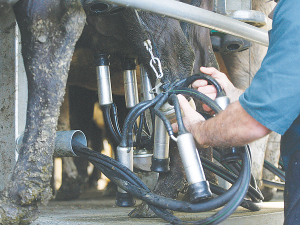Editorial: Morale booster
OPINION: The first three Global Dairy Trade (GDT) auctions have been a morale booster for farmers.
 Last week’s Global Dairy Trade (GDT) auction saw prices drop 2.8%, with the key whole milk powder (WMP) prices falling 4.2%.
Last week’s Global Dairy Trade (GDT) auction saw prices drop 2.8%, with the key whole milk powder (WMP) prices falling 4.2%.
Dairy prices are easing but cost inflation is down across the board, providing some relief to farmers.
Last week's Global Dairy Trade (GDT) auction saw prices drop 2.8% and the key whole milk powder (WMP) prices fell 4.2%. Most products posted price falls - the exception being anhydrous milk fat which rose 2.5%. The auction was notably weaker than pre-auction expectations and futures market trends.
Westpac chief economist Kelly Eckhold notes that support from the three main regions that usually pick up the bulk of product in the auctions was weaker this time.
"Chinese buyers pulled back further as did Middle Eastern buyers a touch. In contrast to the weaker auctions last year, this time we saw regions that don't usually feature in the top three purchasers have to pick up the slack in the auction - which presumably contributed to the weak result."
However, he says Chinese demand remains around the 10-year average.
Overall, dairy prices remain around long-term averages, but on-farm costs have increased significantly over this time.
But Eckhold says latest data shows cost increases on-farm normalised in 2023 and came in close to their forecasts at an average of 2.4% over 2023.
He points out that cost inflation fell almost across the board. The only main area where costs inflation increased in 2023 compared to 2022 was with respect to central government and local authority rates and fees.
"These high and sticky cost increases have also been felt outside the farming sector. Significant declines in costs were seen in fertiliser, feed and fuel which was in large part due to the easing in supply-chain pressures seen globally now that Covid and the impact of the Russian war in Ukraine are a bit further behind us."
However, debt servicing costs remain elevated and are expected to remain high over 2024 as the RBNZ brings inflation under control.
Eckhold believes a saving grace is that interest rates currently look to have peaked. Wages costs are expected to moderate from the very high levels seen in recent years as the labour market continues to ease.
"The outlook for on-farm costs is relatively flat from here. As most cost categories have now normalised, we now see on-farm inflation trending close to aggregate economy inflation rates in the coming couple of years. That means on-farm cost inflation at around 3% in 2024 and 1.9% in 2025," he says.
Controls on the movement of fruit and vegetables in the Auckland suburb of Mt Roskill have been lifted.
Fonterra farmer shareholders and unit holders are in line for another payment in April.
Farmers are being encouraged to take a closer look at the refrigerants running inside their on-farm systems, as international and domestic pressure continues to build on high global warming potential (GWP) 400-series refrigerants.
As expected, Fonterra has lifted its 2025-26 forecast farmgate milk price mid-point to $9.50/kgMS.
Bovonic says a return on investment study has found its automated mastitis detection technology, QuadSense, is delivering financial, labour, and animal-health benefits on New Zealand dairy farms worth an estimated $29,547 per season.
Pāmu has welcomed ten new apprentices into its 2026 intake, marking the second year of a scheme designed to equip the next generation of farmers with the skills, knowledge, and experience needed for a thriving career in agriculture.

OPINION: Here w go: the election date is set for November 7 and the politicians are out of the gate…
OPINION: ECan data was released a few days ago showing Canterbury farmers have made “giant strides on environmental performance”.